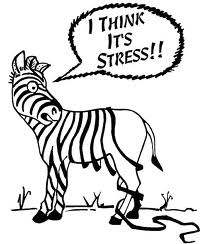 If we feel and look around us we so often find ourselves “driven” by forces out of our control that we perceive as stressful. We find ourselves under pressure, in a constant state of hectic activity with no time to relax. More and more people are succumbing to these pressures with a burnout, depression or other psychological disorders.
If we feel and look around us we so often find ourselves “driven” by forces out of our control that we perceive as stressful. We find ourselves under pressure, in a constant state of hectic activity with no time to relax. More and more people are succumbing to these pressures with a burnout, depression or other psychological disorders.
Not a day goes by without some publication, giving us some tip on how to deal with the stresses of modern life.
In psychological terms stress is defined as a psychological and physical response of the body in reaction to changing conditions. These conditions may be real or perceived and has a powerful effect on mental functioning.
The last point is particularly poignant. Is having stress all in the mind? A lot of recent medical research is focusing on just this question. Some people obviously manage to deal much better with change than others.
Why do some people really take off when they are under pressure, finding in themselves enormous stamina and creative flow while others doing the same work under the same conditions suffer from chronic exhaustion and end up having a burnout.
I think its time to put some things into perspective. Compared to previous generations and compared to much of humanity in the so-called Third World, we in the industrialised West live a pretty comfortable life – at least in material terms. In order to get something to eat, we merely take a drive down to the next supermarket where we have a choice of foods that no other generation ever experienced. We have warm homes in winter with central heating and in the warmer areas air conditioning in summer. We have a life expectancy that is much higher on average than that of our great-grandparents.
Would you really want to go back in time to the Middle Ages when people lived in constant fear of dying in warfare, from famine or disease. The wealthiest king or queen did not have the choice and comforts of life that the average person enjoys today. So what has gone wrong? Why are we so under stress?
Today’s stress is primarily not about physical but about emotional and social survival.
When we are under stress, our sympathetic nervous system initiates a “fight or flight” reaction, restricting blood flow, raising blood pressure, releasing adrenaline and the stress hormone cortisol, slowing body functions so that all energy can be used to fight the stressor. After the perceived danger has passed, the parasympathetic system takes over, decreasing heartbeat and relaxing blood vessels.
In our modern world our stress response is activated so frequently that the nervous system doesn’t have a chance to return to normal, resulting in a state of chronic stress. There is a chronic imbalance between activity and relaxation. It is very often the same type of stress over a long period of time that takes its toll.
In my consultancy for many different types of business on corporate health issues, there appear to be several common denominators that cause negative stress among employees, leading to growing absenteeism from burnout or depression:
Here are the most common:
-
Management that fails to communicate to its employees that they are really valued as fellow human beings. Simple acts of courtesy fall by the wayside with employees merely seen as “a human resource” costing xxxx number of dollars or euros a month.
-
Performance is measured merely in individual output with social skills such as team play not being taken into consideration.
-
Total control with little or no freedom in utilising personal skills or creativity
-
Round the clock availability via email or cell phone, even during vacation time
-
Finding no meaning, vision or real perspective in the job one is doing
-
No time allowed or taken for real breaks where colleagues can communicate with each other
-
No time for relaxation or physical exercise during work time
People don’t just go to work to earn money. It is the place where they spend the largest portion of their lives, where they interact with fellow human beings, seek meaning in their lives and find the challenges that make them grow and become fully human. Companies that really understand this and train their managers to lead people rather than machines will inevitably lead the field, even in highly competitive market segments.
More information on the Five Elements in my book “Yield and Overcome”: http://goo.gl/TXSgw0

